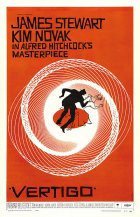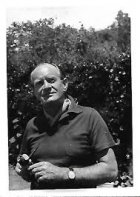
Vertigo Page #9
- PG
- Year:
- 1958
- 128 min
- 4,219 Views
Scottie gets out of his car and looks off out of picture.
EXT. BRIDGE - (SUNSET) - LONG SHOT
Madeleine walking away round the dockside. The vast bridge
towers above her. She carries the nosegay. Scottie moves
into the f.g., and makes off in the same direction. Madeleine
disappears round the corner of the old fort wall. Now she
is out of sight, we see Scottie quicken his pace as he
approaches the corner of the fort wall.
EXT. BRIDGE - (SUNSET) - MEDIUM SHOT
SHOOTING back, we see Scottie approach the wall and peer
cautiously around.
EXT. BRIDGE - (SUNSET) - SEMI-LONG SHOT
From his viewpoint, we see Madeleine standing at the waters'
edge. She is mechanically tearing off the lace-edged paper
from the nosegay.
EXT. BRIDGE - (SUNSET) - CLOSEUP
Scottie watching her curiously.
EXT. BRIDGE - (SUNSET) - SEMI-CLOSEUP
Madeleine lets the paper drift away down to the water. She
proceeds to unwind the wire around the flowers and begins to
scatter them an the water.
CLOSE SHOT OF FLOWERS FLOATING ON THE WATER
EXT. BRIDGE - (SUNSET) - CLOSEUP
Scottie watching Madeleine.
EXT. DOCKSIDE - (SUNSET) - SEMI-LONG SHOT
The full figure of Madeleine, scattering the rest of the
flowers. Then she raises her head and stares up at the sky.
A moment in which her body seem poised, and then she is gone,
lost to view in the water.
EXT. DOCKSIDE - (SUNSET) - LONG SHOT
Scottie dashes around the wall and the CAMERA PANS him to
the water's edge. He is throwing his coat off.
EXT. DOCKSIDE - (SUNSET) - SEMI-LONG SHOT
SHOOTING down into the water, we see Madeleine's upturned
face as she floats away. She disappears now and again.
EXT. DOCKSIDE - (SUNSET) - MEDIUM SHOT
SCOTTIE, running down the few stone steps towards the water.
When the water is up to his knees, he swims out towards her.
EXT. DOCKSIDE - (SUNSET) - CLOSEUP MADELEINE
Her eyes staring, sinks beneath the water. She is surrounded
by the scattered flowers. Scottie swims in and grabs her.
EXT. DOCKSIDE - (SUNSET) - CLOSEUP
As he holds her, the two heads are pressed together. He turns
and starts to swim back with her. The screen is filled with
their two heads. Madeleine's staring eyes begin to close as
she is moved away.
LAP DISSOLVE:
EXT. DOCKSIDE - (SUNSET) - MEDIUM SHOT
We see Scottie coming up some stone steps. He is staggering
with the weight of Madeleine's water-soaked body and clothes.
He carries her over towards the green Jaguar.
EXT. DOCKSIDE - (SUNSET) - MEDIUM SHOT
Resting her for a moment, he throws open the door on the
passenger's side.
EXT. DOCKSIDE - (SUNSET)
Scottie's head is close to hers. She is now breathing heavily.
SCOTTIE:
(whispering)
Are you all right?
Her eyes open slowly.
SCOTTIE:
(Calling softly)
Madeleine...
Her eyes show no sign of recognition or response; they move
past his face and stare out. The CAMERA SLOWLY MOVES IN
until her head fills the screen. She stares out as though in
a trance.
DISSOLVE TO:
EXT.SCOTTIE'S APARTMENT - (DUSK)
The empty green Jaguar is drawn up at the curb before the
red door of a small, well-kept house.
DISSOLVE TO:
INT. SCOTTIE'S APARTMENT - (NIGHT)
We are in the living room of a comfortable a bachelor
apartment. There is a picture window that looks up to Coit
Tower on Telegraph Hill. The room is softly lit. A fire is
lit in the fireplace; the logs are blazing well, Scottie, in
a pair of grey trousers and an old sweater, is wandering
about the room, trying to think things out. Through an open
door we can see into a small kitchen where Madeleine's clothes -
all of them - hang, on a cord over the electric stove, drying.
And through another open door we can see into the bedroom
where Madeleine lies, in the larger-than-single bed, under
the covers, asleep. She sighs and turns restlessly, and
Scottie glances at her from the living-room as he wanders,
and then she turns again, and the sigh becomes words, spoken
in sleep, and he stops, and listens.
MADELEINE:
(Faintly, distantly)
Please... thank you... please...
Scottie waits, taut, but there is no more. He starts to turn
away and suddenly, still distant, but more clearly:
MADELEINE:
(Appealingly)
Where is my child?... have you seen
my child...?
Scottie stiffens with the shock of recognition and his eyes
go wide with apprehension staring at the lost, eye-closed,
troubled woman in the bed. And at that moment the telephone
on the bedside table rings sharply. He makes a dash for it.
The ringing brings the woman to with a sharp start, and she
instinctively clutches the bedclothes to her chin and raises
up a little and stares with wide-eyed fright at the man
running towards her. Scottie takes the phone.
SCOTTIE:
Yes?... No, it's all right; I'll
call you back. Yes. Yes!
He hangs up, and tries to smile down at Madeleine, who has
not moved, but has followed his every move with fright and
apprehension.
SCOTTIE:
Are you all right?
No answer, only the eyes staring at him. And then he realizes,
with some embarrassment, that she cannot move, that she is
naked under the bedclothes, and he reaches across to the
dressing gown he has laid out for her on the bed, and moves
it closer to her.
SCOTTIE:
Oh... you'll want this...
He gives her a reassuring nod and smile, straightens up and
goes to the door, and goes into the living room, closing the
bedroom door behind him. And she stares after him as he goes.
In the living room, he moves to the fireplace, puts another
log on, and watches it catch. The bedroom door behind him
opens, and he turns to face Madeleine. She has the dressing
gown belted tightly around the middle and holds it together
with one band at her breast. And she stands there staring at
him nervously, frightened, not wanting to admit that she
does not know how she came there, but wanting very much to
know. And she cannot help herself: knowing her own fears,
she has to ask.
MADELEINE:
Why am I here? What happened?
SCOTTIE:
You...
(Then, not liking the
sound of the truth)
...fell into the Bay.
She puts a hand slowly to her hair, understanding now why it
is wet.
SCOTTIE:
I dried your hair as well as I could.
But you'd better come here by the
fire.
And now, knowing that he dried her hair, she realizes that
he must have taken her clothes off, too, and she looks down
at her body with deep awareness of her nakedness, and draws
the dressing gown more closely to her, and looks back at him
with frightened embarrassment. And her head begins to move
quickly, the eyes darting about the apartment as though
seeking a way of escape, and she sees the clothes hanging in
the kitchen. And she looks back to Scottie appealingly.
SCOTTIE:
They're almost at dry. Here. Why
don't you come over here?
He pulls a low-stool over before the fire. Madeleine crosses
slowly, keeping her eyes always on him, and sinks down on
the stool. He smiles a at her companionably.
SCOTTIE:
Would you like some coffee?
She shakes her head.
Translation
Translate and read this script in other languages:
Select another language:
- - Select -
- 简体中文 (Chinese - Simplified)
- 繁體中文 (Chinese - Traditional)
- Español (Spanish)
- Esperanto (Esperanto)
- 日本語 (Japanese)
- Português (Portuguese)
- Deutsch (German)
- العربية (Arabic)
- Français (French)
- Русский (Russian)
- ಕನ್ನಡ (Kannada)
- 한국어 (Korean)
- עברית (Hebrew)
- Gaeilge (Irish)
- Українська (Ukrainian)
- اردو (Urdu)
- Magyar (Hungarian)
- मानक हिन्दी (Hindi)
- Indonesia (Indonesian)
- Italiano (Italian)
- தமிழ் (Tamil)
- Türkçe (Turkish)
- తెలుగు (Telugu)
- ภาษาไทย (Thai)
- Tiếng Việt (Vietnamese)
- Čeština (Czech)
- Polski (Polish)
- Bahasa Indonesia (Indonesian)
- Românește (Romanian)
- Nederlands (Dutch)
- Ελληνικά (Greek)
- Latinum (Latin)
- Svenska (Swedish)
- Dansk (Danish)
- Suomi (Finnish)
- فارسی (Persian)
- ייִדיש (Yiddish)
- հայերեն (Armenian)
- Norsk (Norwegian)
- English (English)
Citation
Use the citation below to add this screenplay to your bibliography:
Style:MLAChicagoAPA
"Vertigo" Scripts.com. STANDS4 LLC, 2025. Web. 22 Jan. 2025. <https://www.scripts.com/script/vertigo_1423>.







Discuss this script with the community:
Report Comment
We're doing our best to make sure our content is useful, accurate and safe.
If by any chance you spot an inappropriate comment while navigating through our website please use this form to let us know, and we'll take care of it shortly.
Attachment
You need to be logged in to favorite.
Log In